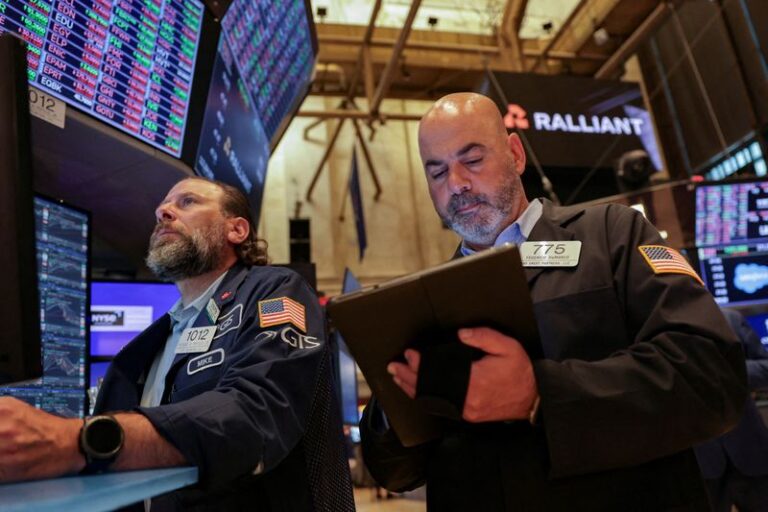By Nikhil Sharma and Pranav Kashyap
(Reuters) -Wall Street’s main indexes were higher on Friday after EU officials signaled that a framework trade deal with the U.S. could be signed as soon as this weekend, while Intel tumbled following a disappointing forecast.
At 11:36 a.m. the Dow Jones Industrial Average rose 71.91 points, or 0.15%, to 44,762.88, creeping up to the record high it had touched on December 4. The S&P 500 gained 15.65 points, or 0.24%, to 6,378.89, and the Nasdaq Composite gained 51.29 points, or 0.25%, to 21,110.19.
Intel dropped 9% after the chipmaker forecast steeper third-quarter losses than expected and announced plans to slash jobs.
Deckers Outdoor soared 18% after beating first-quarter revenue and profit estimates on resilient demand for its sneakers and boots in international markets.
Meanwhile, diplomats said the proposed agreement would set a 15% baseline tariff on EU goods entering the U.S. and a 50% levy on European steel and aluminum. President Donald Trump said earlier in the day the odds of a U.S.-EU trade deal were “50-50”.
Negotiations with South Korea, too, accelerated as countries scrambled to sidestep Trump’s steep import duties.
“It’s another notch in the gun where trade victories seem to be a driving force right now,” said Sam Stovall, chief investment strategist at CFRA Research.
“Wall Street’s being rewarded for its belief that these are negotiating tactics rather than realities. And until that changes, investors will continue to be encouraged by additional agreements.”
The flurry of trade progress including fresh agreements with Japan, Indonesia and the Philippines helped set the three major indexes on track for a strong finish to the week, if gains hold.
However, the week also saw some setbacks. Heavyweights Tesla and General Motors stumbled and were on track for their steepest weekly losses in nearly two months if the declines continue.
Tesla CEO Elon Musk warned of tougher quarters ahead amid shrinking U.S. EV subsidies, while General Motors took a hit after absorbing a $1.1-billion blow in its second-quarter earnings from Trump’s tariffs.
The focus turns to the U.S. Federal Reserve meeting next week, with Wall Street widely expecting the central bank to hold interest rates steady as it weighs the impact of the tariffs on inflation.
Trump stepped up his campaign for borrowing costs to be lowered after a rare visit to Fed headquarters on Thursday. Often a vocal critic of Fed Chair Jerome Powell, he claimed on Friday that their meeting had gone well and hinted that Powell might be warming to the idea of rate cuts.
